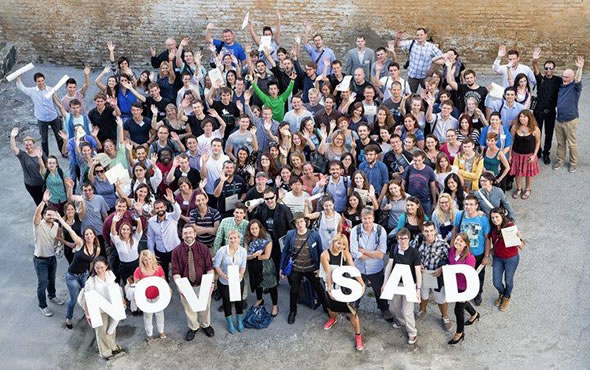Have you ever got excited about learning to speak a language?
I mean REALLY excited.

Maybe you met a beautiful girl or a hot guy from another country.
Maybe you heard a song in a foreign language that sounds so good it touches your soul.
Or maybe you bought this new language learning book/program that looks very promising.
And every time, when something got you excited, you are so sure that you will finally stick to it and learn to speak the language you’ve always wanted to speak, once and for all.
This motivation will last for about a week or two, maybe a month if you are really motivated.
Then what happened?
Life happened.
“I will just learn tomorrow.” or “I will get back to it next month when I have more time. For sure.”
Essentially, you stopped learning.
And sooner or later, something will get you excited to learn your target language again!!
But the same faith of losing motivation over time is like a curse that never goes away.
If you are embarrassed, guilty or even ashamed of being stuck in this vicious cycle for more than a few years, I understand, because I’ve been there before.
My language learning progress was laughable.
The good news is, we are not the only one.
I’ve spoken with hundreds of language learners around the world, from beginners to hyper polyglots, we all face the same dilemma.
The bottom line is, it doesn’t matter if you have:
- The most effective language learning method in the world
- The most comprehensive language learning materials
- The most amazing language learning software or app
It’s completely useless if you are not able to stay motivated to use it and learn consistently over time.
So the lack of consistent motivation is every language learner’s biggest roadblock to fluency.
3 Things that Suck Your Motivation Away
1. Too Hard, Too Easy or Too Boring.
Your language learning activities have a big impact on your motivation.
If you do something too hard, too easy or too boring, would you want to do it again the next day?
Most likely, you will be less motivated compared to when you first started.
The key is to find multiple language learning activities that is not only effective for your language learning style and it has to be something that you enjoy doing.
You need multiple language learning activities because if we do the same thing over and over again, it’s inevitable that you will eventually get bored.
So experiment and find language learning activities that are:
- Something you enjoy doing
- Effective for your learning style
Then put them on rotation and switch things up once in awhile to keep things fresh.
The key to meeting any of your language learning goal is this:
“Do whatever it takes in this hour, for you to want to learn another hour tomorrow.”
-Anthony Lauder, Polyglot
Note: Sometimes it takes a little bit of time to get used to a new activity for it to become fun and effective. So you need to fully give it a try and take some time to adjust it so it works for you. If you just try it once and abandon it, you will be missing out without giving it a chance to work.
2. No Clear Define Goal With An End Date
Most language learners usually say, “I want to learn Spanish.” or “I want to learn Mandarin” without any specific goal with an end date, so what usually happens?
Nothing much.
No matter what we want to accomplish in life, without a specific, measurable goal with a time frame to strive for, we will usually just let the drift of life take us away instead of getting what we want.
Learning a language is no different, especially as we live in a world full of distractions which could pull us to many different directions.
So if learning your target language is important to you, make sure you create a specific measurable goal with an end date.
For example, if you want to take your reading skills to another level, then set a goal to read 3 books in the foreign language in 3 months.
Or if you like to finally speak your target language, take on holding a 15 minutes conversation with a native speaker in 90 days with other language learners around the world in the Add1Challenge.
Here are some videos from past Add1Challengers’ 15+ minutes conversation with a native speakers on day 91, many started from scratch or learning their first ever foreign language. So a 15 minutes conversation with a native in 90 days is totally possible.
3. The Feeling of Being Alone
“If you want to go fast, go alone. If you want to go far, go together.”
– African Proverb
As you know, learning a language is a long journey and it requires consistent hard work over a long period of time.
If learning a language alone is not challenging enough, adding the two motivation suckers above makes staying motivated even harder.
Which is why you should tap into the power of learning with a community.
If you have done any kind of sports like basketball, running or even yoga, the experience of practicing alone compared to practicing with a group of people is like the difference between night and day.
There is magic that can’t be explained in words when we’re learning something together as a community and being part of something larger than ourselves.
Learning together in a community is not only more effective, it is also a lot more fun too.
So seek out language learning communities online that resonates with you and supports you to achieve your language learning goals.
Here are a few communities that I recommend:
Lang-8.com – Lang-8 is a community where you can practice your writing by posting something in the foreign language. Native speakers from around the world will then correct your writing. In return, you do the same by correcting other people’s post in your native language.
iTalki.com – italki.com has a similar function as Lang-8, where you can post your writing and get correction from native speaker. The only difference is, italki.com is also a easy and affordable place where you can find a language tutor. What’s good about that is, maybe your tutor would be correcting your writing and you can get feedback directly from your tutor during your lesson.
Add1Challenge – Add1Challenge is a challenge where language learners around the world strive for the goal of holding a 15 minutes conversation with a native speaker in 90 days. We are 100%, solely focus on supporting and motivating you to stay consistent with your learning. There is an application process to ensure everyone who gets in the community are committed to getting result.
Polyglot Conference – The Polyglot Conference is a conference that takes place once a year. It is a conference where language learning enthusiast gather together to meet other language learning enthusiasts around the world, share language learning ideas and practice our target languages. People who attend the conference do not have to polyglots, as long as you are interested in language learning, you will be welcome.
Polyglot Gathering Berlin – Unlike the Polyglot Conference which take place in a different city around the world every year, the Polyglot Gathering Berlin only stays in Berlin. Nevertheless, the vibe and the atmosphere is just as good as the Polyglot Conference. This is also where I met the Simon, the creator of Omniglot for the very first time.
I hope you learned some tips and trick on how to stay motivated when learning a language from this article.
After 300+ language learners around the world went through the Add1Challenge in the past year, I have learned a lot about what it takes to empower language learners to stay motivated, so they would learn consistently and get results that they didn’t think it would be possible before.
If past Add1Challengers can hold a 15 minutes conversation with a native speaker in 90 days, why can’t you?
So if are sick and tired of not getting the result you want and you are ready to take actions, here is a video where I went even more in-dept about the “3 Keys to Stay Motivated When Learning to Speak a Language”.
[youtube https://www.youtube.com/watch?v=m1Jj1BYoAQ4&w=560&h=315]
Let’s finally learn to speak the beautiful language you’ve always wanted to speak, together!



